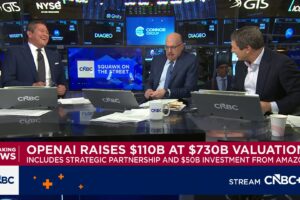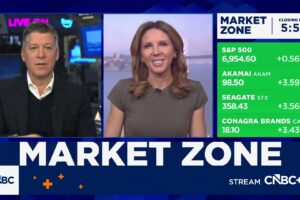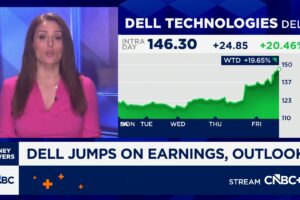About a thousand years ago, the inhabitants of a tiny island in the middle of the Pacific ocean called Yap created a unique form of currency.
An expedition to an island 300 miles away led to the discovery of limestone rock, and since limestone was non-existent on their island, it held great value to the newly arrived Yapese. They started carving the limestone into circular disks, some as big as 12 feet in diameter, with a hole in the center so they could be carried using logs. These were then transported back to Yap to become a vital part of trade on the island.


Image Source: MyWallSt
There are two interesting notes about these Rai stones, as they came to be called. The first is that the value of them did not rely on the size or the craftsmanship per se, but usually on some anecdotal factor associated with the stone. For example, if a number of people had died in the mining and transport of the stone, its value would be higher.
The second is that because the stones were so large, the practice was often to simply leave them wherever they were and transfer ownership through oral agreement. If one villager wished to pay another using his stone, he wouldn’t have it moved from his house to the others. He would just tell everyone in the village that the stone’s ownership had been transferred. Once everyone in the village knew who owned the stone, it wasn’t really important where it sat.
This system may sound primitive but the world is actually becoming a lot more aligned with how the Yapese did business than the ancient Greeks or Romans. At this very moment, we are witnessing a dramatic shift away from the use of cash and toward digital and mobile payments — from physical currency to notional structures of value.
This is been driven by great advances in technology and security, but also by governments. A move away from cash provides governments with more transparency, allows them to more easily collect tax revenue, and cracks down illicit activities like organized crime. It is also claimed (though refuted by some) that a move to cashless will be instrumental in preventing the funding of terrorism.
A Tale of Two Countries
To get a glimpse into what the future holds, it’s usually prudent to look toward Scandinavia — in this case, Sweden.
In 1661, the precursor to Sweden’s central bank issued Europe’s first banknotes. Today, they are the outright leaders in the race to become the world’s first cashless country by 2023. For many years, Swedish buses have refused to take cash and now even street vendors and churches prefer to be paid via Swish, a Venmo-style mobile payments platform.
<p class="canvas-atom canvas-text Mb(1.0em) Mb(0)–sm Mt(0.8em)–sm" type="text" content="Cards are out and out the most popular form of payment, with only 13% of Swedes reported to have used cash for a purchase in 2018, down from around 40% in 2010. The majority of Sweden’s banks no longer hold cash or accept cash deposits, and many of them are even removing their ATMs.” data-reactid=”32″>Cards are out and out the most popular form of payment, with only 13% of Swedes reported to have used cash for a purchase in 2018, down from around 40% in 2010. The majority of Sweden’s banks no longer hold cash or accept cash deposits, and many of them are even removing their ATMs.
Heading down to the subcontinent of India and we see a much more extreme approach. In November 2016, India’s Prime Minister Narendra Modi announced the demonetization of the 500 and 1000 rupee notes. This effectively wiped out 86% of the country’s physical currency overnight.
In theory, the notes could be exchanged for new notes up to 4,000 rupees per person, but anything over that would have to be put into a bank account. This is a country where less than 50% of the population had a bank account though, so the move caused widespread panic. Many people lost their life-savings and over 100 people died as a result of being forced to queue for hours to get their money exchanged before the deadline.
With these two extreme examples, we can see how governments have weighed in on taking their countries cashless — one using incentives and the other using brute force. But elsewhere around the world, the move to digital and mobile is happening with little or no government intervention.
<p class="canvas-atom canvas-text Mb(1.0em) Mb(0)–sm Mt(0.8em)–sm" type="text" content="In fact, a 2018 global payments report by Capgemini predicts that non-cash transactions will accelerate at a compound annual growth rate (CAGR) of 12.7% globally by 2021, with emerging markets specifically growing at a faster rate of 21.6%.” data-reactid=”40″>In fact, a 2018 global payments report by Capgemini predicts that non-cash transactions will accelerate at a compound annual growth rate (CAGR) of 12.7% globally by 2021, with emerging markets specifically growing at a faster rate of 21.6%.
It’s clear that the payment landscape is going in one direction only, so how can we as investors take advantage?
Who Will Benefit?
Looking out into the sea of payment providers, there are some distinct leaders in the space.
<p class="canvas-atom canvas-text Mb(1.0em) Mb(0)–sm Mt(0.8em)–sm" type="text" content="Mastercard (NYSE: MA) is one of the most appealing companies right now, a $267 billion behemoth with unparalleled global brand recognition. CEO Ajay Banga has instilled a culture of innovation within the company so that they continue to see robust revenue growth (almost 20% in 2018) despite its massive size. As the world becomes cashless, security will also become a significant concern. Banga said:” data-reactid=”44″>Mastercard (NYSE: MA) is one of the most appealing companies right now, a $267 billion behemoth with unparalleled global brand recognition. CEO Ajay Banga has instilled a culture of innovation within the company so that they continue to see robust revenue growth (almost 20% in 2018) despite its massive size. As the world becomes cashless, security will also become a significant concern. Banga said:
We remain very focused on security. Our investments in technologies like biometrics, tokens, encryption, and artificial intelligence are redefining the way both consumers and transactions are protected.
<p class="canvas-atom canvas-text Mb(1.0em) Mb(0)–sm Mt(0.8em)–sm" type="text" content="Another payments company with an impressive brand is PayPal (NASDAQ: PYPL). Once a mere subsidiary of eBay, PayPal is now about 4 times bigger than its one-time parent and has a range of ancillary companies of its own that are deeply integrated into the cashless landscape. Venmo is probably the biggest success story from the PayPal family, with the popular payment app recently crossing the 40 million user milestone. More behind the scenes, the company’s Braintree and Paydiant divisions are the technology that drives simple and fast payments through companies like Uber and Airbnb. PayPal also owns Xoom and TIO Networks, both of which assist in transferring funds and paying bills for under-served markets. And if that wasn’t impressive enough, PayPal also acquired iZettle last year, known as "the Square of Europe", to better compete in the point-of-sale space.” data-reactid=”47″>Another payments company with an impressive brand is PayPal (NASDAQ: PYPL). Once a mere subsidiary of eBay, PayPal is now about 4 times bigger than its one-time parent and has a range of ancillary companies of its own that are deeply integrated into the cashless landscape. Venmo is probably the biggest success story from the PayPal family, with the popular payment app recently crossing the 40 million user milestone. More behind the scenes, the company’s Braintree and Paydiant divisions are the technology that drives simple and fast payments through companies like Uber and Airbnb. PayPal also owns Xoom and TIO Networks, both of which assist in transferring funds and paying bills for under-served markets. And if that wasn’t impressive enough, PayPal also acquired iZettle last year, known as “the Square of Europe”, to better compete in the point-of-sale space.
<p class="canvas-atom canvas-text Mb(1.0em) Mb(0)–sm Mt(0.8em)–sm" type="text" content="Finally, one company that we believe could be an unexpected winner in the payments space is Apple (NASDAQ: AAPL). Though it’s one of the world’s most valuable companies, Apple is in the midst of a significant pivot at the moment as it tries to reduce its dependence on hardware sales and move toward high-margin revenue from its Services division. Recently, it was estimated that 43% of global iPhone users have enabled Apple Pay — which would translate into roughly 383 million individuals. Plus, with the company’s new partnership with Goldman Sachs to launch a credit card, Tim Cook & Co look well placed to ride on the crest of a cashless future.” data-reactid=”48″>Finally, one company that we believe could be an unexpected winner in the payments space is Apple (NASDAQ: AAPL). Though it’s one of the world’s most valuable companies, Apple is in the midst of a significant pivot at the moment as it tries to reduce its dependence on hardware sales and move toward high-margin revenue from its Services division. Recently, it was estimated that 43% of global iPhone users have enabled Apple Pay — which would translate into roughly 383 million individuals. Plus, with the company’s new partnership with Goldman Sachs to launch a credit card, Tim Cook & Co look well placed to ride on the crest of a cashless future.
<p class="canvas-atom canvas-text Mb(1.0em) Mb(0)–sm Mt(0.8em)–sm" type="text" content="MyWallSt operates a full disclosure policy. MyWallSt staff currently hold long positions in Apple, Mastercard, and PayPal.” data-reactid=”49″>MyWallSt operates a full disclosure policy. MyWallSt staff currently hold long positions in Apple, Mastercard, and PayPal.
<p class="canvas-atom canvas-text Mb(1.0em) Mb(0)–sm Mt(0.8em)–sm" type="text" content="Find more of the companies leading the way toward a cashless future in the MyWallSt app now, available for iOS or Android.” data-reactid=”50″>Find more of the companies leading the way toward a cashless future in the MyWallSt app now, available for iOS or Android.










